The Influence of Artificial Intelligence on Growth: Mandrake Hotel
VerifiedAdded on 2023/01/06
|12
|2349
|32
Report
AI Summary
This report explores the influence of Artificial Intelligence (AI) on the growth and development of organizations, focusing on The Mandrake Hotel as a case study. It aims to determine the concept of AI in organizational growth, identify ways hotels can leverage AI for growth, and explore the challenges of AI implementation. The research employs a quantitative data collection method, utilizing a deductive research approach and positivism research philosophy. Data will be gathered from both primary (questionnaires) and secondary sources (journals, articles, books) with a probabilistic sampling method targeting 50 participants, ensuring ethical research practices. The study reviews existing literature on AI's role in business growth, highlighting its potential to enhance customer service, data analysis, and overall profitability, while also acknowledging potential challenges such as technical failures and security concerns.

Paraphrase This Document
Need a fresh take? Get an instant paraphrase of this document with our AI Paraphraser
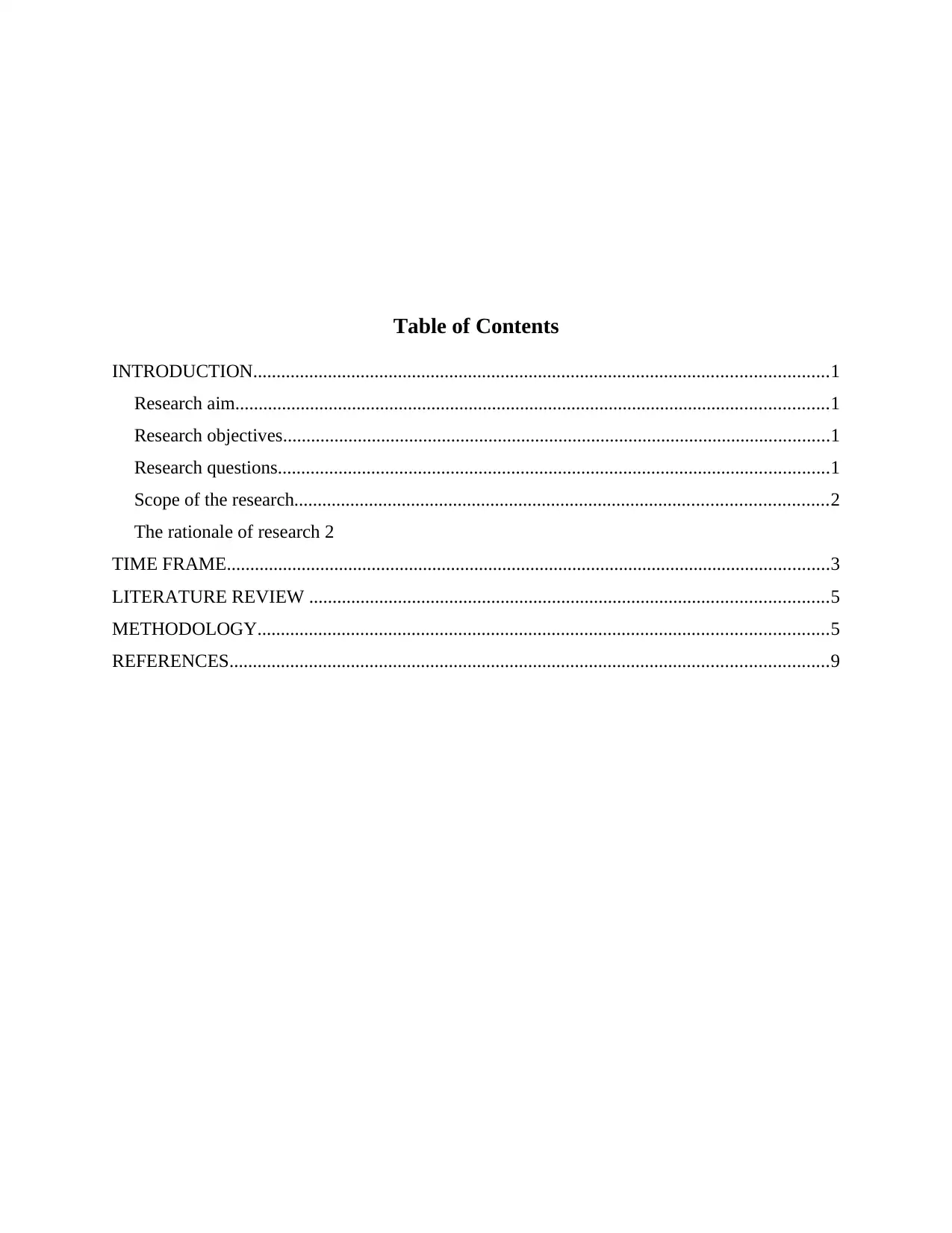
Table of Contents
INTRODUCTION...........................................................................................................................1
Research aim...............................................................................................................................1
Research objectives.....................................................................................................................1
Research questions......................................................................................................................1
Scope of the research..................................................................................................................2
The rationale of research 2
TIME FRAME.................................................................................................................................3
LITERATURE REVIEW ...............................................................................................................5
METHODOLOGY..........................................................................................................................5
REFERENCES................................................................................................................................9
INTRODUCTION...........................................................................................................................1
Research aim...............................................................................................................................1
Research objectives.....................................................................................................................1
Research questions......................................................................................................................1
Scope of the research..................................................................................................................2
The rationale of research 2
TIME FRAME.................................................................................................................................3
LITERATURE REVIEW ...............................................................................................................5
METHODOLOGY..........................................................................................................................5
REFERENCES................................................................................................................................9
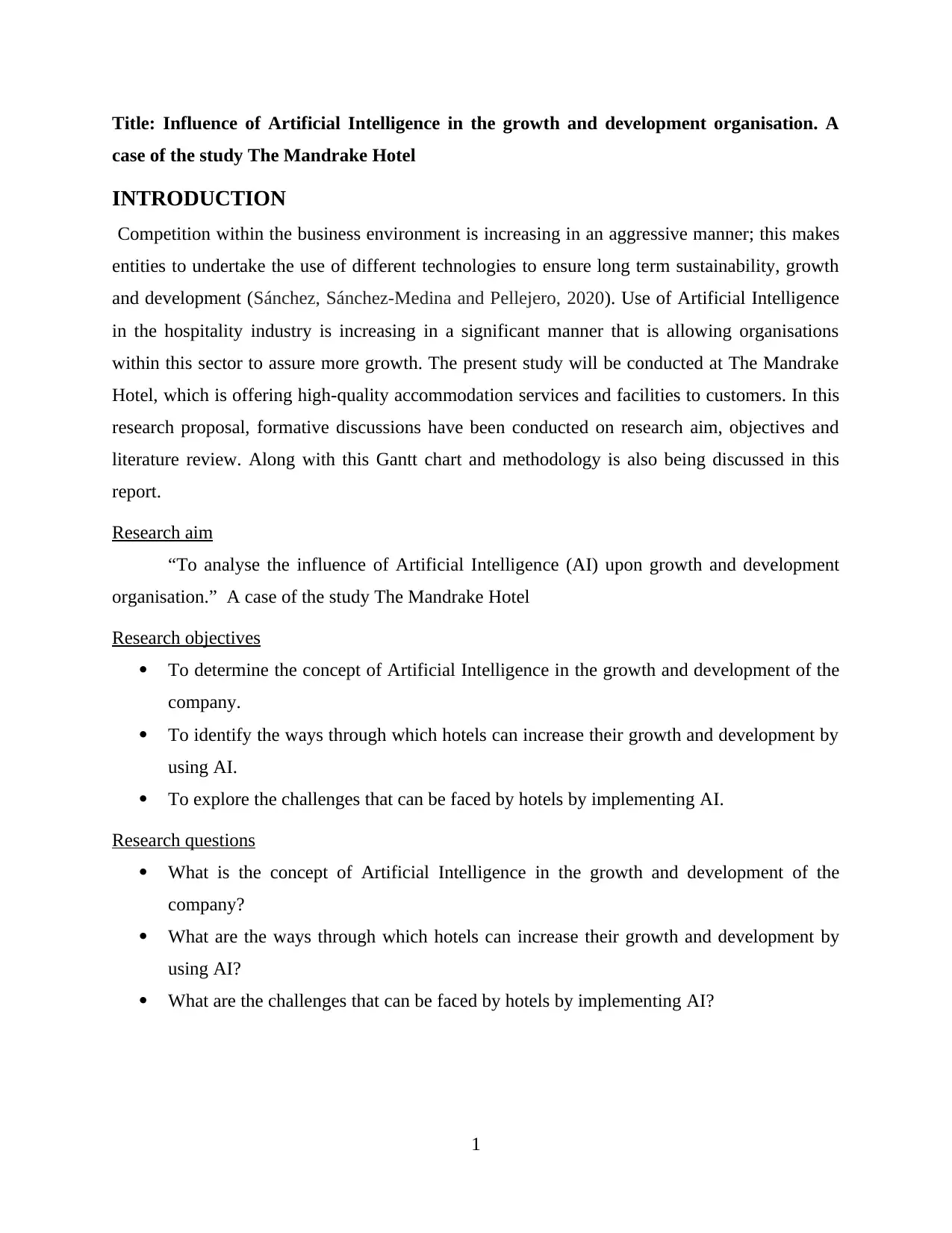
Title: Influence of Artificial Intelligence in the growth and development organisation. A
case of the study The Mandrake Hotel
INTRODUCTION
Competition within the business environment is increasing in an aggressive manner; this makes
entities to undertake the use of different technologies to ensure long term sustainability, growth
and development (Sánchez, Sánchez-Medina and Pellejero, 2020). Use of Artificial Intelligence
in the hospitality industry is increasing in a significant manner that is allowing organisations
within this sector to assure more growth. The present study will be conducted at The Mandrake
Hotel, which is offering high-quality accommodation services and facilities to customers. In this
research proposal, formative discussions have been conducted on research aim, objectives and
literature review. Along with this Gantt chart and methodology is also being discussed in this
report.
Research aim
“To analyse the influence of Artificial Intelligence (AI) upon growth and development
organisation.” A case of the study The Mandrake Hotel
Research objectives
To determine the concept of Artificial Intelligence in the growth and development of the
company.
To identify the ways through which hotels can increase their growth and development by
using AI.
To explore the challenges that can be faced by hotels by implementing AI.
Research questions
What is the concept of Artificial Intelligence in the growth and development of the
company?
What are the ways through which hotels can increase their growth and development by
using AI?
What are the challenges that can be faced by hotels by implementing AI?
1
case of the study The Mandrake Hotel
INTRODUCTION
Competition within the business environment is increasing in an aggressive manner; this makes
entities to undertake the use of different technologies to ensure long term sustainability, growth
and development (Sánchez, Sánchez-Medina and Pellejero, 2020). Use of Artificial Intelligence
in the hospitality industry is increasing in a significant manner that is allowing organisations
within this sector to assure more growth. The present study will be conducted at The Mandrake
Hotel, which is offering high-quality accommodation services and facilities to customers. In this
research proposal, formative discussions have been conducted on research aim, objectives and
literature review. Along with this Gantt chart and methodology is also being discussed in this
report.
Research aim
“To analyse the influence of Artificial Intelligence (AI) upon growth and development
organisation.” A case of the study The Mandrake Hotel
Research objectives
To determine the concept of Artificial Intelligence in the growth and development of the
company.
To identify the ways through which hotels can increase their growth and development by
using AI.
To explore the challenges that can be faced by hotels by implementing AI.
Research questions
What is the concept of Artificial Intelligence in the growth and development of the
company?
What are the ways through which hotels can increase their growth and development by
using AI?
What are the challenges that can be faced by hotels by implementing AI?
1
⊘ This is a preview!⊘
Do you want full access?
Subscribe today to unlock all pages.

Trusted by 1+ million students worldwide
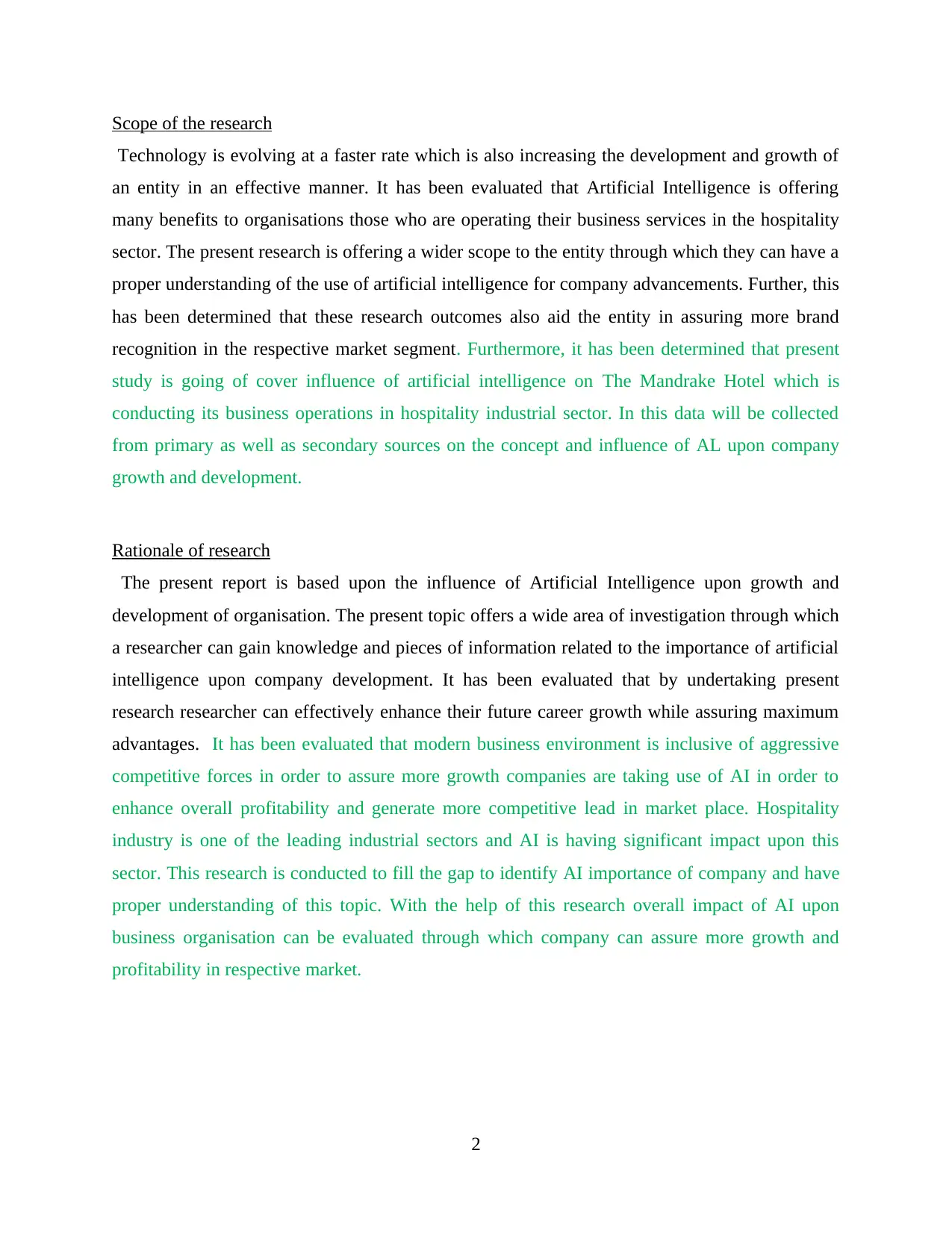
Scope of the research
Technology is evolving at a faster rate which is also increasing the development and growth of
an entity in an effective manner. It has been evaluated that Artificial Intelligence is offering
many benefits to organisations those who are operating their business services in the hospitality
sector. The present research is offering a wider scope to the entity through which they can have a
proper understanding of the use of artificial intelligence for company advancements. Further, this
has been determined that these research outcomes also aid the entity in assuring more brand
recognition in the respective market segment. Furthermore, it has been determined that present
study is going of cover influence of artificial intelligence on The Mandrake Hotel which is
conducting its business operations in hospitality industrial sector. In this data will be collected
from primary as well as secondary sources on the concept and influence of AL upon company
growth and development.
Rationale of research
The present report is based upon the influence of Artificial Intelligence upon growth and
development of organisation. The present topic offers a wide area of investigation through which
a researcher can gain knowledge and pieces of information related to the importance of artificial
intelligence upon company development. It has been evaluated that by undertaking present
research researcher can effectively enhance their future career growth while assuring maximum
advantages. It has been evaluated that modern business environment is inclusive of aggressive
competitive forces in order to assure more growth companies are taking use of AI in order to
enhance overall profitability and generate more competitive lead in market place. Hospitality
industry is one of the leading industrial sectors and AI is having significant impact upon this
sector. This research is conducted to fill the gap to identify AI importance of company and have
proper understanding of this topic. With the help of this research overall impact of AI upon
business organisation can be evaluated through which company can assure more growth and
profitability in respective market.
2
Technology is evolving at a faster rate which is also increasing the development and growth of
an entity in an effective manner. It has been evaluated that Artificial Intelligence is offering
many benefits to organisations those who are operating their business services in the hospitality
sector. The present research is offering a wider scope to the entity through which they can have a
proper understanding of the use of artificial intelligence for company advancements. Further, this
has been determined that these research outcomes also aid the entity in assuring more brand
recognition in the respective market segment. Furthermore, it has been determined that present
study is going of cover influence of artificial intelligence on The Mandrake Hotel which is
conducting its business operations in hospitality industrial sector. In this data will be collected
from primary as well as secondary sources on the concept and influence of AL upon company
growth and development.
Rationale of research
The present report is based upon the influence of Artificial Intelligence upon growth and
development of organisation. The present topic offers a wide area of investigation through which
a researcher can gain knowledge and pieces of information related to the importance of artificial
intelligence upon company development. It has been evaluated that by undertaking present
research researcher can effectively enhance their future career growth while assuring maximum
advantages. It has been evaluated that modern business environment is inclusive of aggressive
competitive forces in order to assure more growth companies are taking use of AI in order to
enhance overall profitability and generate more competitive lead in market place. Hospitality
industry is one of the leading industrial sectors and AI is having significant impact upon this
sector. This research is conducted to fill the gap to identify AI importance of company and have
proper understanding of this topic. With the help of this research overall impact of AI upon
business organisation can be evaluated through which company can assure more growth and
profitability in respective market.
2
Paraphrase This Document
Need a fresh take? Get an instant paraphrase of this document with our AI Paraphraser
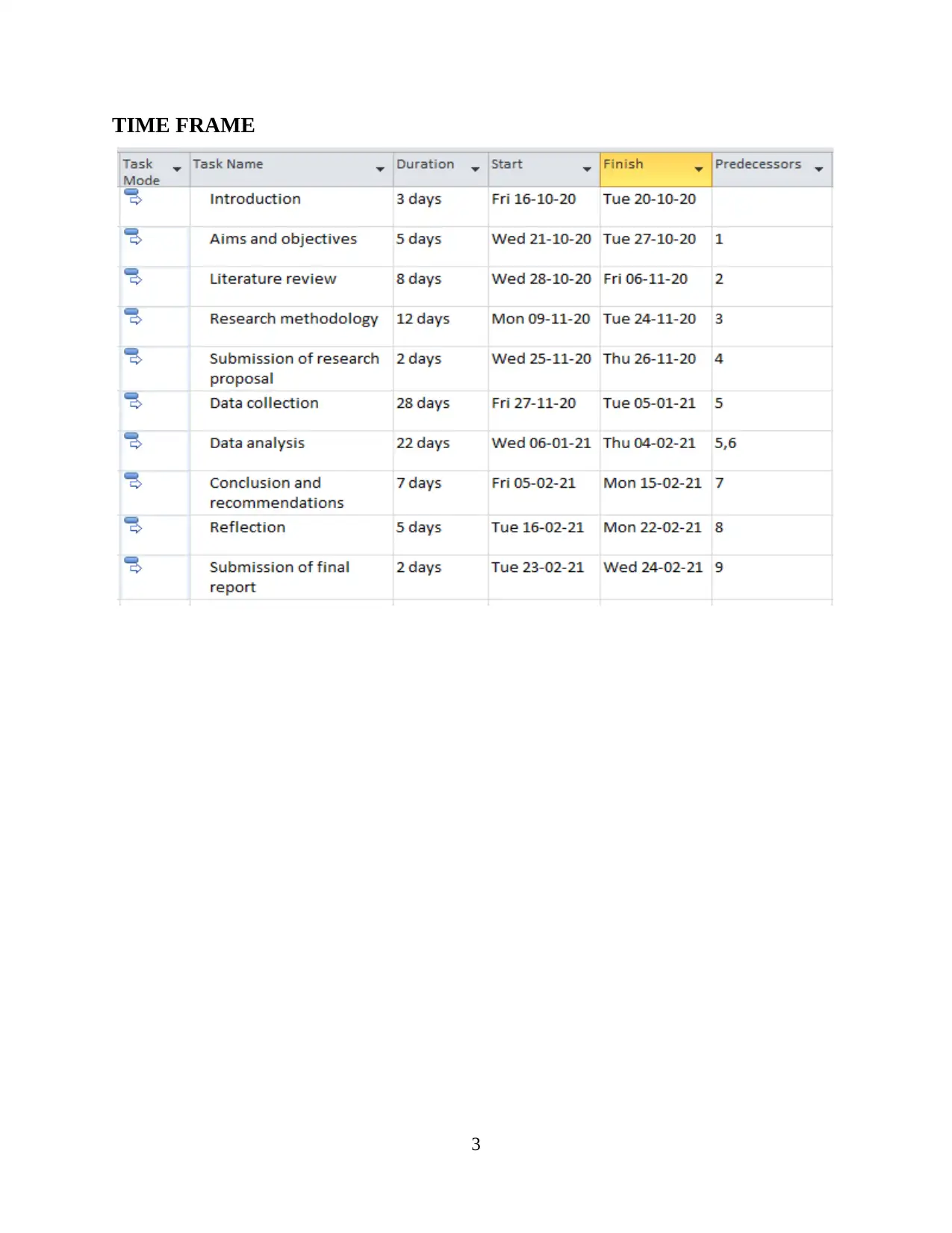
TIME FRAME
3
3
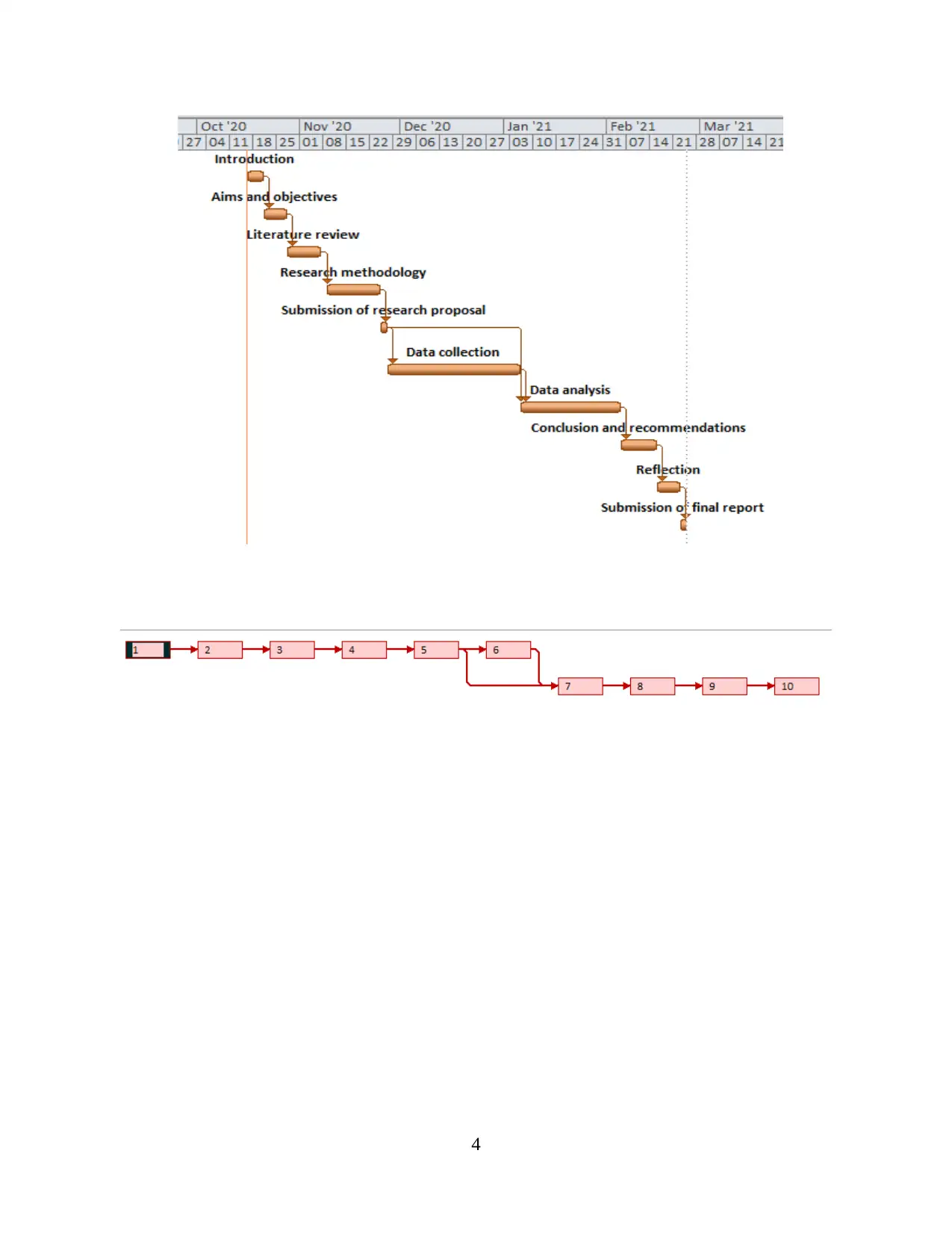
4
⊘ This is a preview!⊘
Do you want full access?
Subscribe today to unlock all pages.

Trusted by 1+ million students worldwide
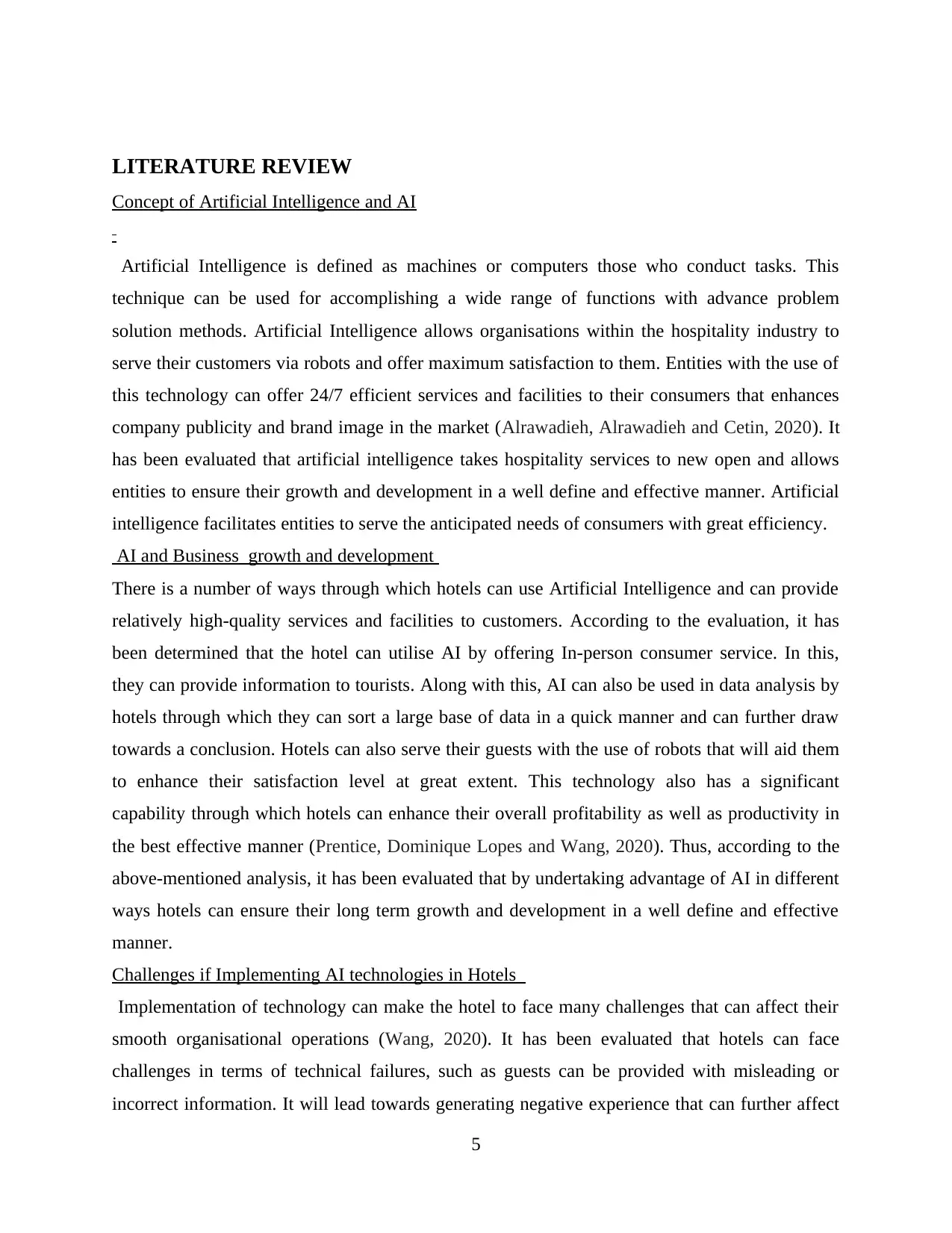
LITERATURE REVIEW
Concept of Artificial Intelligence and AI
Artificial Intelligence is defined as machines or computers those who conduct tasks. This
technique can be used for accomplishing a wide range of functions with advance problem
solution methods. Artificial Intelligence allows organisations within the hospitality industry to
serve their customers via robots and offer maximum satisfaction to them. Entities with the use of
this technology can offer 24/7 efficient services and facilities to their consumers that enhances
company publicity and brand image in the market (Alrawadieh, Alrawadieh and Cetin, 2020). It
has been evaluated that artificial intelligence takes hospitality services to new open and allows
entities to ensure their growth and development in a well define and effective manner. Artificial
intelligence facilitates entities to serve the anticipated needs of consumers with great efficiency.
AI and Business growth and development
There is a number of ways through which hotels can use Artificial Intelligence and can provide
relatively high-quality services and facilities to customers. According to the evaluation, it has
been determined that the hotel can utilise AI by offering In-person consumer service. In this,
they can provide information to tourists. Along with this, AI can also be used in data analysis by
hotels through which they can sort a large base of data in a quick manner and can further draw
towards a conclusion. Hotels can also serve their guests with the use of robots that will aid them
to enhance their satisfaction level at great extent. This technology also has a significant
capability through which hotels can enhance their overall profitability as well as productivity in
the best effective manner (Prentice, Dominique Lopes and Wang, 2020). Thus, according to the
above-mentioned analysis, it has been evaluated that by undertaking advantage of AI in different
ways hotels can ensure their long term growth and development in a well define and effective
manner.
Challenges if Implementing AI technologies in Hotels
Implementation of technology can make the hotel to face many challenges that can affect their
smooth organisational operations (Wang, 2020). It has been evaluated that hotels can face
challenges in terms of technical failures, such as guests can be provided with misleading or
incorrect information. It will lead towards generating negative experience that can further affect
5
Concept of Artificial Intelligence and AI
Artificial Intelligence is defined as machines or computers those who conduct tasks. This
technique can be used for accomplishing a wide range of functions with advance problem
solution methods. Artificial Intelligence allows organisations within the hospitality industry to
serve their customers via robots and offer maximum satisfaction to them. Entities with the use of
this technology can offer 24/7 efficient services and facilities to their consumers that enhances
company publicity and brand image in the market (Alrawadieh, Alrawadieh and Cetin, 2020). It
has been evaluated that artificial intelligence takes hospitality services to new open and allows
entities to ensure their growth and development in a well define and effective manner. Artificial
intelligence facilitates entities to serve the anticipated needs of consumers with great efficiency.
AI and Business growth and development
There is a number of ways through which hotels can use Artificial Intelligence and can provide
relatively high-quality services and facilities to customers. According to the evaluation, it has
been determined that the hotel can utilise AI by offering In-person consumer service. In this,
they can provide information to tourists. Along with this, AI can also be used in data analysis by
hotels through which they can sort a large base of data in a quick manner and can further draw
towards a conclusion. Hotels can also serve their guests with the use of robots that will aid them
to enhance their satisfaction level at great extent. This technology also has a significant
capability through which hotels can enhance their overall profitability as well as productivity in
the best effective manner (Prentice, Dominique Lopes and Wang, 2020). Thus, according to the
above-mentioned analysis, it has been evaluated that by undertaking advantage of AI in different
ways hotels can ensure their long term growth and development in a well define and effective
manner.
Challenges if Implementing AI technologies in Hotels
Implementation of technology can make the hotel to face many challenges that can affect their
smooth organisational operations (Wang, 2020). It has been evaluated that hotels can face
challenges in terms of technical failures, such as guests can be provided with misleading or
incorrect information. It will lead towards generating negative experience that can further affect
5
Paraphrase This Document
Need a fresh take? Get an instant paraphrase of this document with our AI Paraphraser
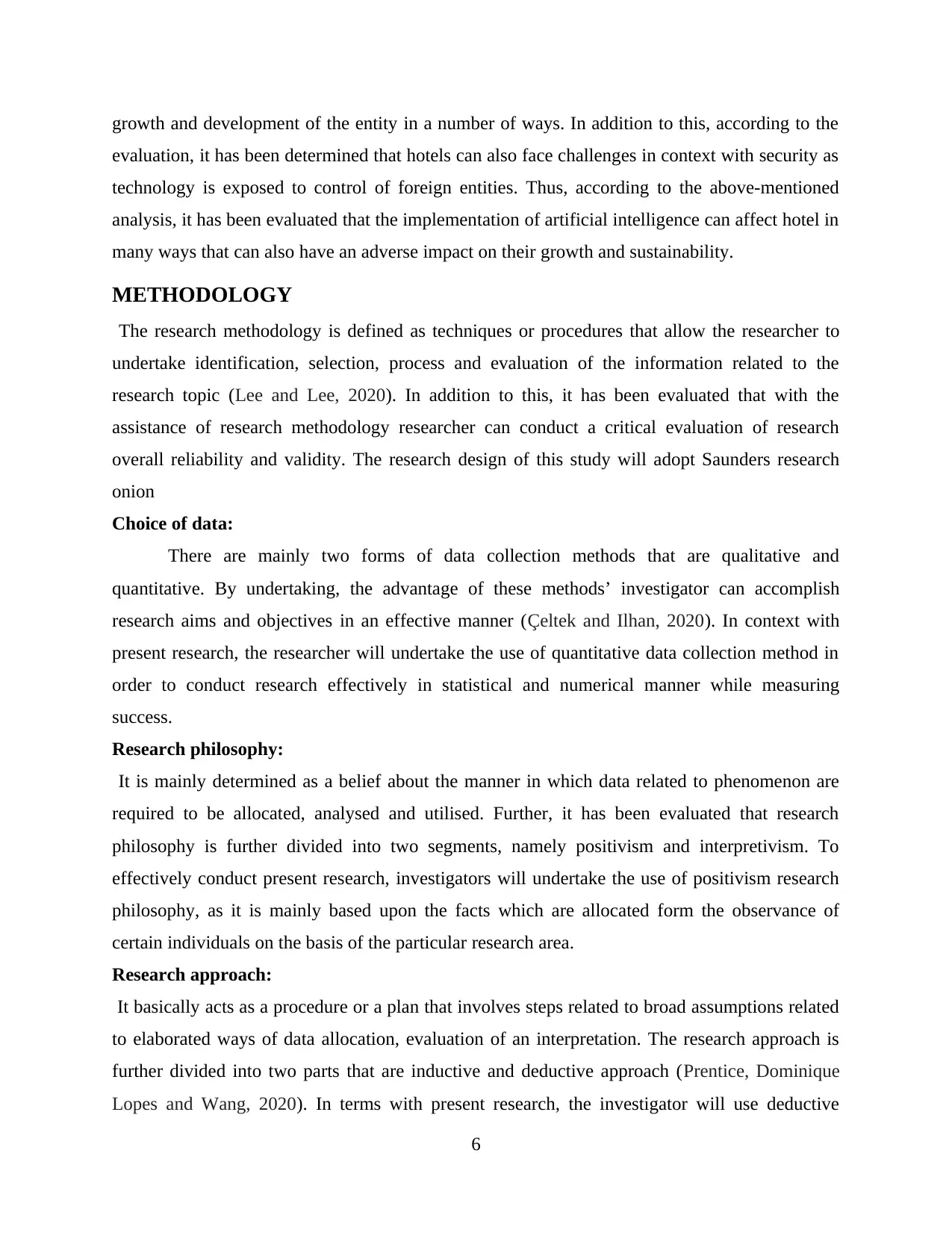
growth and development of the entity in a number of ways. In addition to this, according to the
evaluation, it has been determined that hotels can also face challenges in context with security as
technology is exposed to control of foreign entities. Thus, according to the above-mentioned
analysis, it has been evaluated that the implementation of artificial intelligence can affect hotel in
many ways that can also have an adverse impact on their growth and sustainability.
METHODOLOGY
The research methodology is defined as techniques or procedures that allow the researcher to
undertake identification, selection, process and evaluation of the information related to the
research topic (Lee and Lee, 2020). In addition to this, it has been evaluated that with the
assistance of research methodology researcher can conduct a critical evaluation of research
overall reliability and validity. The research design of this study will adopt Saunders research
onion
Choice of data:
There are mainly two forms of data collection methods that are qualitative and
quantitative. By undertaking, the advantage of these methods’ investigator can accomplish
research aims and objectives in an effective manner (Çeltek and Ilhan, 2020). In context with
present research, the researcher will undertake the use of quantitative data collection method in
order to conduct research effectively in statistical and numerical manner while measuring
success.
Research philosophy:
It is mainly determined as a belief about the manner in which data related to phenomenon are
required to be allocated, analysed and utilised. Further, it has been evaluated that research
philosophy is further divided into two segments, namely positivism and interpretivism. To
effectively conduct present research, investigators will undertake the use of positivism research
philosophy, as it is mainly based upon the facts which are allocated form the observance of
certain individuals on the basis of the particular research area.
Research approach:
It basically acts as a procedure or a plan that involves steps related to broad assumptions related
to elaborated ways of data allocation, evaluation of an interpretation. The research approach is
further divided into two parts that are inductive and deductive approach (Prentice, Dominique
Lopes and Wang, 2020). In terms with present research, the investigator will use deductive
6
evaluation, it has been determined that hotels can also face challenges in context with security as
technology is exposed to control of foreign entities. Thus, according to the above-mentioned
analysis, it has been evaluated that the implementation of artificial intelligence can affect hotel in
many ways that can also have an adverse impact on their growth and sustainability.
METHODOLOGY
The research methodology is defined as techniques or procedures that allow the researcher to
undertake identification, selection, process and evaluation of the information related to the
research topic (Lee and Lee, 2020). In addition to this, it has been evaluated that with the
assistance of research methodology researcher can conduct a critical evaluation of research
overall reliability and validity. The research design of this study will adopt Saunders research
onion
Choice of data:
There are mainly two forms of data collection methods that are qualitative and
quantitative. By undertaking, the advantage of these methods’ investigator can accomplish
research aims and objectives in an effective manner (Çeltek and Ilhan, 2020). In context with
present research, the researcher will undertake the use of quantitative data collection method in
order to conduct research effectively in statistical and numerical manner while measuring
success.
Research philosophy:
It is mainly determined as a belief about the manner in which data related to phenomenon are
required to be allocated, analysed and utilised. Further, it has been evaluated that research
philosophy is further divided into two segments, namely positivism and interpretivism. To
effectively conduct present research, investigators will undertake the use of positivism research
philosophy, as it is mainly based upon the facts which are allocated form the observance of
certain individuals on the basis of the particular research area.
Research approach:
It basically acts as a procedure or a plan that involves steps related to broad assumptions related
to elaborated ways of data allocation, evaluation of an interpretation. The research approach is
further divided into two parts that are inductive and deductive approach (Prentice, Dominique
Lopes and Wang, 2020). In terms with present research, the investigator will use deductive
6
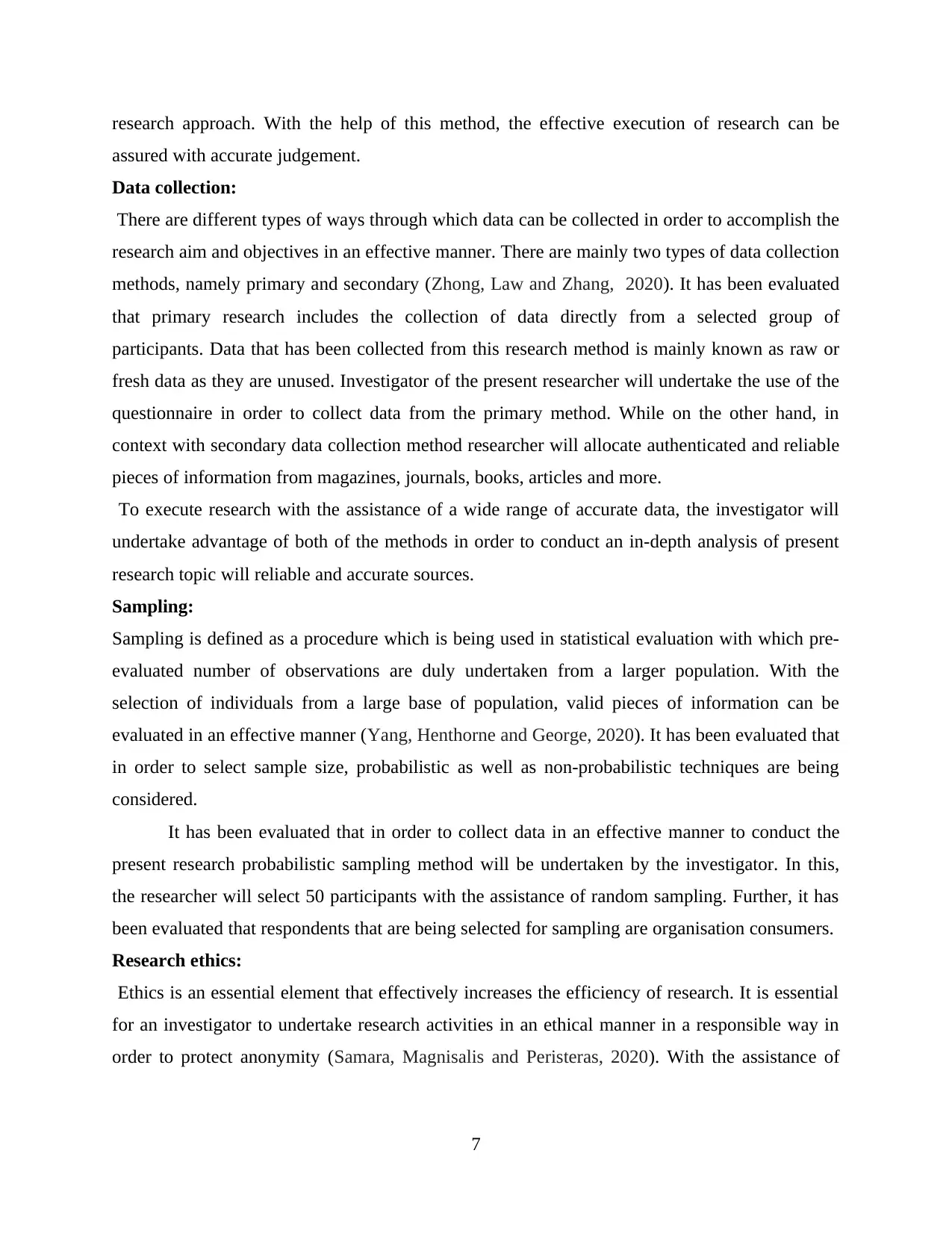
research approach. With the help of this method, the effective execution of research can be
assured with accurate judgement.
Data collection:
There are different types of ways through which data can be collected in order to accomplish the
research aim and objectives in an effective manner. There are mainly two types of data collection
methods, namely primary and secondary (Zhong, Law and Zhang, 2020). It has been evaluated
that primary research includes the collection of data directly from a selected group of
participants. Data that has been collected from this research method is mainly known as raw or
fresh data as they are unused. Investigator of the present researcher will undertake the use of the
questionnaire in order to collect data from the primary method. While on the other hand, in
context with secondary data collection method researcher will allocate authenticated and reliable
pieces of information from magazines, journals, books, articles and more.
To execute research with the assistance of a wide range of accurate data, the investigator will
undertake advantage of both of the methods in order to conduct an in-depth analysis of present
research topic will reliable and accurate sources.
Sampling:
Sampling is defined as a procedure which is being used in statistical evaluation with which pre-
evaluated number of observations are duly undertaken from a larger population. With the
selection of individuals from a large base of population, valid pieces of information can be
evaluated in an effective manner (Yang, Henthorne and George, 2020). It has been evaluated that
in order to select sample size, probabilistic as well as non-probabilistic techniques are being
considered.
It has been evaluated that in order to collect data in an effective manner to conduct the
present research probabilistic sampling method will be undertaken by the investigator. In this,
the researcher will select 50 participants with the assistance of random sampling. Further, it has
been evaluated that respondents that are being selected for sampling are organisation consumers.
Research ethics:
Ethics is an essential element that effectively increases the efficiency of research. It is essential
for an investigator to undertake research activities in an ethical manner in a responsible way in
order to protect anonymity (Samara, Magnisalis and Peristeras, 2020). With the assistance of
7
assured with accurate judgement.
Data collection:
There are different types of ways through which data can be collected in order to accomplish the
research aim and objectives in an effective manner. There are mainly two types of data collection
methods, namely primary and secondary (Zhong, Law and Zhang, 2020). It has been evaluated
that primary research includes the collection of data directly from a selected group of
participants. Data that has been collected from this research method is mainly known as raw or
fresh data as they are unused. Investigator of the present researcher will undertake the use of the
questionnaire in order to collect data from the primary method. While on the other hand, in
context with secondary data collection method researcher will allocate authenticated and reliable
pieces of information from magazines, journals, books, articles and more.
To execute research with the assistance of a wide range of accurate data, the investigator will
undertake advantage of both of the methods in order to conduct an in-depth analysis of present
research topic will reliable and accurate sources.
Sampling:
Sampling is defined as a procedure which is being used in statistical evaluation with which pre-
evaluated number of observations are duly undertaken from a larger population. With the
selection of individuals from a large base of population, valid pieces of information can be
evaluated in an effective manner (Yang, Henthorne and George, 2020). It has been evaluated that
in order to select sample size, probabilistic as well as non-probabilistic techniques are being
considered.
It has been evaluated that in order to collect data in an effective manner to conduct the
present research probabilistic sampling method will be undertaken by the investigator. In this,
the researcher will select 50 participants with the assistance of random sampling. Further, it has
been evaluated that respondents that are being selected for sampling are organisation consumers.
Research ethics:
Ethics is an essential element that effectively increases the efficiency of research. It is essential
for an investigator to undertake research activities in an ethical manner in a responsible way in
order to protect anonymity (Samara, Magnisalis and Peristeras, 2020). With the assistance of
7
⊘ This is a preview!⊘
Do you want full access?
Subscribe today to unlock all pages.

Trusted by 1+ million students worldwide

undertaking ethical practices researcher can reduce unnecessary risk or issue that can affect
outcomes of research in future.
8
outcomes of research in future.
8
Paraphrase This Document
Need a fresh take? Get an instant paraphrase of this document with our AI Paraphraser

9
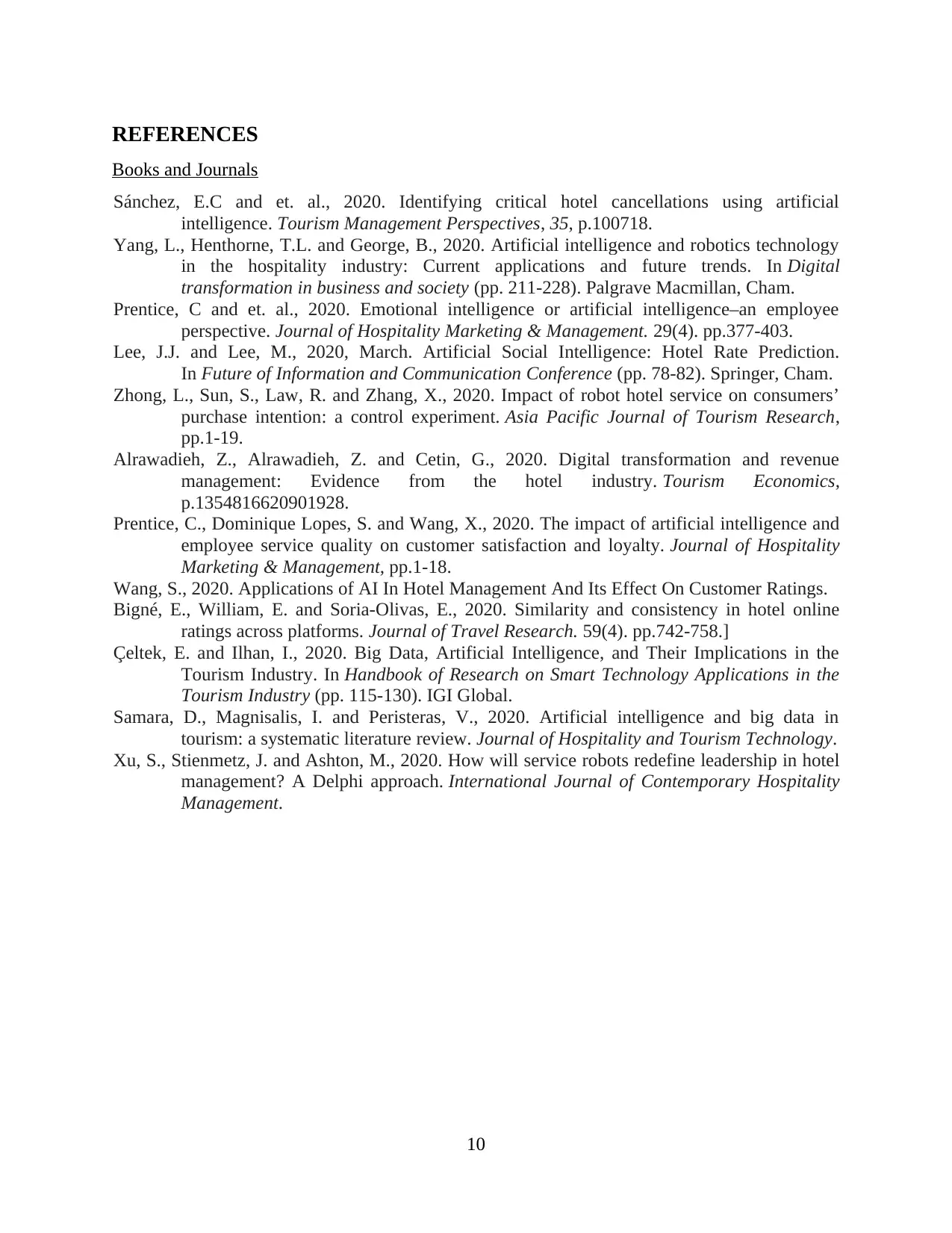
REFERENCES
Books and Journals
Sánchez, E.C and et. al., 2020. Identifying critical hotel cancellations using artificial
intelligence. Tourism Management Perspectives, 35, p.100718.
Yang, L., Henthorne, T.L. and George, B., 2020. Artificial intelligence and robotics technology
in the hospitality industry: Current applications and future trends. In Digital
transformation in business and society (pp. 211-228). Palgrave Macmillan, Cham.
Prentice, C and et. al., 2020. Emotional intelligence or artificial intelligence–an employee
perspective. Journal of Hospitality Marketing & Management. 29(4). pp.377-403.
Lee, J.J. and Lee, M., 2020, March. Artificial Social Intelligence: Hotel Rate Prediction.
In Future of Information and Communication Conference (pp. 78-82). Springer, Cham.
Zhong, L., Sun, S., Law, R. and Zhang, X., 2020. Impact of robot hotel service on consumers’
purchase intention: a control experiment. Asia Pacific Journal of Tourism Research,
pp.1-19.
Alrawadieh, Z., Alrawadieh, Z. and Cetin, G., 2020. Digital transformation and revenue
management: Evidence from the hotel industry. Tourism Economics,
p.1354816620901928.
Prentice, C., Dominique Lopes, S. and Wang, X., 2020. The impact of artificial intelligence and
employee service quality on customer satisfaction and loyalty. Journal of Hospitality
Marketing & Management, pp.1-18.
Wang, S., 2020. Applications of AI In Hotel Management And Its Effect On Customer Ratings.
Bigné, E., William, E. and Soria-Olivas, E., 2020. Similarity and consistency in hotel online
ratings across platforms. Journal of Travel Research. 59(4). pp.742-758.]
Çeltek, E. and Ilhan, I., 2020. Big Data, Artificial Intelligence, and Their Implications in the
Tourism Industry. In Handbook of Research on Smart Technology Applications in the
Tourism Industry (pp. 115-130). IGI Global.
Samara, D., Magnisalis, I. and Peristeras, V., 2020. Artificial intelligence and big data in
tourism: a systematic literature review. Journal of Hospitality and Tourism Technology.
Xu, S., Stienmetz, J. and Ashton, M., 2020. How will service robots redefine leadership in hotel
management? A Delphi approach. International Journal of Contemporary Hospitality
Management.
10
Books and Journals
Sánchez, E.C and et. al., 2020. Identifying critical hotel cancellations using artificial
intelligence. Tourism Management Perspectives, 35, p.100718.
Yang, L., Henthorne, T.L. and George, B., 2020. Artificial intelligence and robotics technology
in the hospitality industry: Current applications and future trends. In Digital
transformation in business and society (pp. 211-228). Palgrave Macmillan, Cham.
Prentice, C and et. al., 2020. Emotional intelligence or artificial intelligence–an employee
perspective. Journal of Hospitality Marketing & Management. 29(4). pp.377-403.
Lee, J.J. and Lee, M., 2020, March. Artificial Social Intelligence: Hotel Rate Prediction.
In Future of Information and Communication Conference (pp. 78-82). Springer, Cham.
Zhong, L., Sun, S., Law, R. and Zhang, X., 2020. Impact of robot hotel service on consumers’
purchase intention: a control experiment. Asia Pacific Journal of Tourism Research,
pp.1-19.
Alrawadieh, Z., Alrawadieh, Z. and Cetin, G., 2020. Digital transformation and revenue
management: Evidence from the hotel industry. Tourism Economics,
p.1354816620901928.
Prentice, C., Dominique Lopes, S. and Wang, X., 2020. The impact of artificial intelligence and
employee service quality on customer satisfaction and loyalty. Journal of Hospitality
Marketing & Management, pp.1-18.
Wang, S., 2020. Applications of AI In Hotel Management And Its Effect On Customer Ratings.
Bigné, E., William, E. and Soria-Olivas, E., 2020. Similarity and consistency in hotel online
ratings across platforms. Journal of Travel Research. 59(4). pp.742-758.]
Çeltek, E. and Ilhan, I., 2020. Big Data, Artificial Intelligence, and Their Implications in the
Tourism Industry. In Handbook of Research on Smart Technology Applications in the
Tourism Industry (pp. 115-130). IGI Global.
Samara, D., Magnisalis, I. and Peristeras, V., 2020. Artificial intelligence and big data in
tourism: a systematic literature review. Journal of Hospitality and Tourism Technology.
Xu, S., Stienmetz, J. and Ashton, M., 2020. How will service robots redefine leadership in hotel
management? A Delphi approach. International Journal of Contemporary Hospitality
Management.
10
⊘ This is a preview!⊘
Do you want full access?
Subscribe today to unlock all pages.

Trusted by 1+ million students worldwide
1 out of 12
Related Documents
Your All-in-One AI-Powered Toolkit for Academic Success.
+13062052269
info@desklib.com
Available 24*7 on WhatsApp / Email
![[object Object]](/_next/static/media/star-bottom.7253800d.svg)
Unlock your academic potential
Copyright © 2020–2026 A2Z Services. All Rights Reserved. Developed and managed by ZUCOL.





